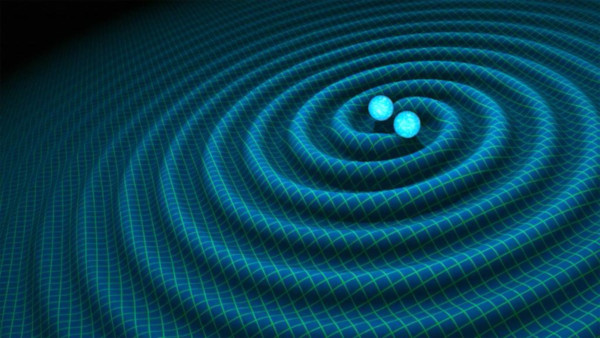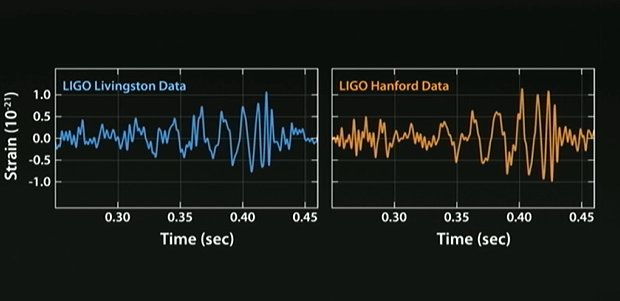Breaking Down the LIGO Announcement
Today I get to put on my physicist hat and talk about a major discovery. Admittedly the aforementioned hat is a little dusty but I'm just excited I get to use those fancy physics degrees of mine for a minute. There may be some of my old professors reading this and to them I profusely apologize and I really hope I didn't screw the explanation up too much.
Anyway, around 100 years ago there was this fellow named Einstein who had funny ideas about gravity and things that moved sufficiently fast. In 1915 Einstein published his General Theory of Relativity which dealt with gravity, basically it said that spacetime was deformable and what we measure as gravity is due to mass distorting that structure. Because of something called the Lorentz invariance of general relativity we had put a speed limit on propagation of information, this included gravity. This also broke with Newtonian physics as Newton had assumed the information from a gravitational interaction was transmitted instantaneously. Out of this fell the prediction of gravity waves. It seemed to make sense conceptually too (at least to me) given the physical construct of gravity general relativity was proposing.
Hypotheses are nice but as Warnher Von Braun once said "one test result is worth one thousand expert opinions." Fast forward around 100 years. Turns out Albert was right about a lot of things. We've measured the deflection of starlight around the sun during a total eclipse, time dilation as predicted by special relativity and dealt with the precession of the perihelion of Mercury with his theories. Over the years relativity has held up to scrutiny, so it's earned the right to be called a theory. Theory has a different denotation for scientists.
This week the team at LIGO announced they had successfully detected gravity waves from colliding black holes. Now we can add gravity waves to the things Einstein was right about. Great. So what does that mean? Well, first off this is a direct observation of binary black holes. Previously we had relied on observations of the space around black holes. The math said singularities should exist, but because we can't observe or measure anything directly from them (anything within the event horizon would have to break the speed of light, an Einsteinian no-no, to reach us) we've relied on watching what they do to the stuff around them.

Visualization of gravity waves produced by black holes spiraling into each other.
However gravity waves give us a back door of sorts into direct observations. When two massive bodies spiral into each other like that they produce changes in the curvature of spacetime that propagate out in a wavelike fashion. Put another way the very thing everything is resting in is distorted in a rhythmic pattern and that pattern travels at the speed of light out in every direction from said event. LIGO measures this with a couple observatories, each have L shaped detectors that are 4 km long on each side. The fine folks over at LIGO fire a laser down each leg and reflect it back and look at the interference pattern. When the spacetime distortion happens the pattern between the two lasers changes and the wave can be measured. This is a gross simplification but you should get the idea. There are two observatories so they can corroborate their results as repeatability and verification is important in science.

Gravity waves as detected by LIGO
That leads us to important part number two. This discovery pretty much opens a whole new realm of observational astronomy and science. Now you can have radio telescopes, optical telescopes and gravity telescopes to take measurements of distant objects. I imagine we'll be able to use gravity wave measurements to figure out more accurate masses of these objects, the energies involved in these collisions and so on. This discovery is on par with Galileo's first telescope. Indeed LIGO is to gravity astronomy what that glass filled tube is to optical astronomy. Better instruments will allow for better data down the line and further testing of Einstein's theories.
Just like electromagnetic waves there is an entire spectrum of gravity waves to investigate. The masses and energies involved will dictate the frequency and amplitude of the waves along with the size of the detector needed to see it. Some gravity waves will take laser interferometers bigger than we can build here on Earth to detect. The closest analog is when Herschel discovered infrared and that the spectrum extended beyond the visible range. Pretty much everything we know about the universe comes from observations of the EM spectrum or particles interacting with detectors here on Earth. We now have another physical quantity to measure. It's like only being able to describe the make and model of a car and now suddenly you can also describe its color. Until the LIGO team's discovery we were basically blind to a fundamental physical interaction.
Does this mean that Einstein had some sort of ultimate theory? Nope. In fact the discovery of gravity waves will allow us to further stretch and test his math. He was really good at math by the way, that thing about him failing it is an urban legend to make you feel better about your own inability. Newton was shown to have a universal theory of gravitation until it failed to explain some phenomena. Today we have problems reconciling Einstein's relativity with some principles in quantum mechanics so it's not without its problems. This is conjecture but it's probable that relativity is a subset of another set of physical laws we not aware of. Newton's theory of gravity actually falls out of the math from relativity so there is precedence for such an idea. That is Newton's gravity are applicable to specific scenarios where as Einstein's are more general. So it stands to guess that there may be an even more general set of theories we don't know about yet. I don't want to bash Newton too much. We still use his laws to put probes around other planets and the guy basically invented calculus on a dare (eat it Leibniz fans).
Practical, everyday applications? Probably nothing for the foreseeable future. Don't expect Star Trek warp drive, Mass Effect biotics or other science fiction leap out of this either. The keyword there is fiction. Of course applications of this discovery could change as technology advances but I wouldn't hold my breath. I'm sure Einstein didn't envision the digital camera when he discovered the photoelectric effect (what he won the Noble Prize for, not relativity) and now practically the whole world has one at its disposal. In my opinion discovery shouldn't have to put food on the table or justify itself to be worthwhile. It's sad that we live in a world where simple curiosity isn't rewarded, but I digress. A greater understanding of the universe is a reward in itself. Well, back to my day gig of making sure college students can still get to Facebook.